Peter MALONE
Saturday, 09 October 2021 13:01
Irving Berlin: An American Song
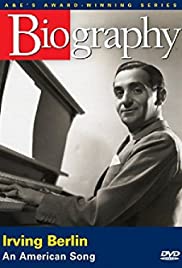
IRVING BERLIN: AN AMERICAN SONG
US, 2001, 89 minutes, Colour.
Written by Michael Epstein.
For fans of American music, of American songs, especially in the first half of the 20th century, this is a most enjoyable experience.
It traces the life of composer Irving Berlin from his young days in the Lower East Side of New York, his family, poverty, his being a singing waiter in restaurants, making an extraordinary breakthrough early with Alexander’s Ragtime Band. The film relies on many photos and footage from the various periods. There are a number of talking heads, especially from two of his daughters, from various musical historians.
It traces his life and success in composition, 2000 songs, many of them hits. There is his service in World War I, his success with the Ziegfeld Follies, on Broadway, the transition to film, very difficult), his support for the troops in World War II, This is The Army. There is his post-war success with Annie Get Your Gun and Call Me Madam. There is his decline with the coming of rock ‘n’ roll which he was not at home with. He was married briefly in 1912 but his wife died of Typhoid Fever. He then married a Catholic woman who was disinherited by her father. They had four children, three girls and a boy who died soon after birth. He and his wife were married for over 60 years and he died in his sleep at the age of 101 in 1989.
The response to detail of the film is well considered by this entry from the IMDb.
Israel Baline Inspires Generations
21 March 2010 | by Weather Violet
Harry Smith narrates this heart-warming two-hour double-episode account of the life and career of Israel Baline, in a presentation debuting on Christmas evening, December 25, 2001.
By way of a pleasant variation from the usual, this begins in 1925, several years after a now-37-year-old Israel Baline becomes songwriter Irving Berlin, with newspaper headlines reporting his "scandalous" relationship with New York City Catholic socialite Ellin Mackay, with dozens of newspapers of the day investigating his impoverished past as one of six children born to an impoverished Russian Jewish immigrant family in Manhattan's Lower East Side.
Withdrawing from school with a third-grade education, Israel works odd jobs, as newspaper carrier, helping the family to make ends meet. At the tender age of 13, Israel loses his father and must now roam the streets, upon which he takes a position as a singing waiter at the Relham Café, where he is appreciated for striking a vulgar twist to popular lyrics.
But when a musician from a rival nightclub publishes a song which generates a musical craze, Israel's employer expects the same from his waiters, and so Israel, by necessity, must pen his first song, "Marie from Sunny Italy" (1907).
In 1911, Ragtime music sweeps the nation, to the disdain of adults who object to the disgrace of a younger generation who rebel along with the movement. Israel bridges the generations by creating a sensitive number to quell the craze, "Alexander's Ragtime Band" (1911), which becomes the first major hit for the songwriter who now goes by the name of Irving Berlin.
Soon, Irving marries the sister, Dorothy, of his songwriting partner, Ray Goetz, and they sail to Cuba for their 1912 honeymoon, where Dorothy contracts Typhoid Fever and passes a few months later. Ray convinces Irving to turn his grieve into a song, which becomes another hit, "When I Lost You" (1912).
After becoming a successful songwriter, Irving is drafted into the Army for service during World War I, in 1918. Because he has worked nights for many years by this time, he cannot adjust to early morning Revile, and pens the song "Oh, How I Hate to Get Up in the Morning" (1918), which leads to the Army's granting Irving the honor of assembling, and performing a musical review, instead of having to rise early.
Returning to Broadway after his discharge, Irving meets Ellin Mackay, whose stern wealthy father, Clarence, strongly objects to her association with him, leading to a heavily-published scandal, which rocks their world from the States to Europe.
Over the years, Irving is affected by the Stock Market crash of 1929, as he also faces challenges on Broadway and in Hollywood during the advent of Talkies, which leads the way to his return to Tinseltown on his own terms, before his compelling service of music and patriotism during the WWII years.
He will go on to break many popular records with his more than 1,000 songs, at least 550 of which are published, 282 reaching "Your Hit Parade's" Top-10, and 35 reaching Number-1, with four songs from "Top Hat" in the Top-5 for a period in 1935.
This follows Irving's life through his marriages with Dorothy Goetz (Feb-July, 1912) and with Ellin Mackay (1926-88), with whom he welcomes three daughters and a son, whom they lose in infancy at three-weeks of age, one Christmas morning.
This episode includes discussions of many stories behind some of Irving's many popular hit songs, which include "Marie from Sunny Italy" (1907), "Alexander's Ragtime Band" (1911), "When I Lost You" (1912), "A Pretty Girl Is Like a Melody" (1915), "Oh, How I Hate to Get Up in the Morning" (1918), "All by Myself" (1921), "All Alone" (1924), "What'll I Do?" (1924), "Always" (1925), "Blue Skies" (1926), "Puttin' on the Ritz" (1930), "Heat Wave" (1933), "Top Hat, White Tie and Tails" (1935), "Cheek to Cheek" (1935), "No Strings" (1935), "Easter Parade" (revised, 1938), "God Bless America" (revised, 1942), "White Christmas" (1942), "There's No Business Like Show Business" (1946) and "Say It With Music" (revised, 1950).
Broadway cast photographs enhance song performance clips from "Watch Your Step" (1914), "Yip! Yip! Yaphank" (1918), "Ziegfeld Follies" (1919), "Music Box Revue" (1921), "As Thousands Cheer" (1933), "This Is the Army" (1942), "Annie Get Your Gun" (1946) and "Call Me Madam" (1950).
Interview Guests for this episode consist of daughters, Mary Ellin Barrett, Linda Louise Emmett and Elizabeth Irving Peters, friends Anna Crouse, Robert Kimball and David and Helen Brown, Actress Bernadette Peters, Actors Ross Elliott and Mandy Patinkin, Performers Susannah McCorkle? and Bobby Short, Stage Manager Alan Anderson, Musical Historian Miles Kreuger, and Biographer Philip Furia.
Archive footage includes Irving Berlin with stars Al Jolson, Eddie Cantor, Douglas Fairbanks Sr., Bebe Daniels, Fred Astaire, Bing Crosby, Kate Smith, Ethel Merman, George Murphy and others in speaking/singing parts, and Vernon and Irene Castle, Edward VIII the Prince of Wales, Ginger Rogers, Marjorie Reynolds, Ronald Reagan and others in non-speaking parts.
Film Clips include a screen glimpse of Irving's compositions through the years, with scenes from "The Jazz Singer (1927), "Puttin' on the Ritz" (1930), "Reaching for the Moon" (1930), "Top Hat" (1935), "Holiday Inn" (1942), "This Is the Army" (1943), "Blue Skies" (1946) and "Call Me Madam" (1953).
Published in Movie Reviews
Published in
Movie Reviews
Saturday, 09 October 2021 13:01
Note: for watching in association with the Poirot mysteries: Being Poirot
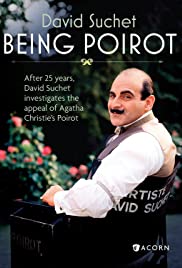
BEING POIROT
UK, 2013, 48 minutes, Colour.
David Suchet
Directed by Chris Malone.
This is an essential documentary for the millions of fans of the television series of Agatha Christie’s Poirot. The first film was made in 1989 when David Suchet was 43. While he filmed Poirot’s death in Curtain before the final production which was Dead Man’s Folly, 2013, at the time of his final appearance, David Suchet was 67.
He is now the host of this documentary, made when he was filming Curtain as well as Dead Man’s Folly.
What makes it essential is the portrait of Suchet as Poirot. Before making the series, which comprises 70 films, short stories as well as novels, he read each story many times, making notes as to Poirot’s character, mannerisms, tics, his Belgian origins, his past success as a detective there, his moving to England as a post-World War I refugee. He then discovered Agatha’s Christie’s description of Poirot’s walk and that consolidated his character, even raising his voice to a higher pitch for Poirot’s speech.
One of the attractions of the film is Suchet’s meeting with various people involved in the production, an interesting discussion with composer Christopher Gunning, Gunning submitting for melodies to the producer, liking the one that was chosen least, but explaining to Suchet how he transposed the light melody to a minor tone and that became the musical hallmark. Suchet also has conversations with his chauffeur, with those doing his make up, with the producer of the films, Brian Eastman.
There is also a visit to Belgium, to the alleged home town of Poirot, seeing his birth certificate (born on April 1!), meeting the Mayor and chief of police of Brussels.
There are many excerpts from the films to illustrate his character, eccentricities, the humour, and Suchet’s tribute to Hugh Fraser, Philip Jackson, Pauline Moran. There is a discussion with Agatha Christie’s grandson, with a historian of the novels, and a look at some of Agatha Christie’s manuscripts – and her referring to him as bombastic, detestable, tiresome and wondering why she ever invented him!
David Suchet pays homage to Charles Laughton who was the first to be Poirot on stage. Then to a 30s film version. He is strong in praise of both Albert Finney and Peter Ustinov for their interpretations. He speaks of the pressure in filming Murder on the Orient Express, deciding to go on a trip on the train, renewing old acquaintances, and his reflections on the issue of letting the murderers leave or hand them over to justice.
It is in this context that he speaks of Agatha Christie’s making Poirot a Belgian, therefore a Catholic, sequences in church, of his faith, praying the rosary, his sense of justice. He goes back to the short film, The Chocolate Box and Poirot’s infatuation with the character, Virginie, and his wearing her emblem throughout his career, Suchet remarks that he was more connected with his head rather than with his heart
There is quite some discussion about the making of Curtain, going to Agatha Christie’s home which became the manor at Styles, the filming of Poirot’s death. However, his final shooting was in Devon at Agatha Christie’s other home, a celebration of the end of a quarter of a century of filming, and emotional atmosphere, Poirot standing at the door of the mansion, then celebratory photos
As has been said, and a further recommendation, this short film should be seen by all those who have enjoyed the Poirot films and David Suchet as the embodiment of Poirot.
Published in Movie Reviews
Published in
Movie Reviews
Saturday, 09 October 2021 13:01
Agatha Christie's Poirot Disappearance of Mr Davenheim
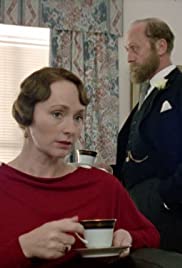
THE DISAPPEARANCE OF MR DAVENHEIM
UK, 1990, 50 minutes, Colour.
David Suchet, Hugh Fraser, Philip Jackson, Pauline Moran, Mel Martin, Kenneth Colley, Tony Matthews.
Directed by Andrew Grieve.
One hopes that Hugh Fraser and Philip Jackson received a higher salary for their work in this episode of the television series of Agatha Christie mysteries with David Suchet as Poirot. They do all the legwork, travel and investigations, interrogations. The Chief Inspector has made a bet with Poirot that he cannot solve the case in a week while remaining in his home. Needless to say, Poirot accepts.
The film introduces us to Mr Davenheim, a banker, his working in his office, leaving his wife, walking to the railway station and disappearing. He was to meet another banker with whom he had difficulties in the past at the station but the visitor walked to the house, waited and angrily departed.
An old fisherman witnesses that there was a blind man walking along the road. Later, Mr Davenheim’s clothes are found in the river. In the meantime, the visitor was a Speedway enthusiast and Hastings admires his vehicle. At a rally, the blind man appears, not blind, and pursued by Hastings and Jack and arrested.
Poirot asks permission to leave his apartment in order to be at the final solution – and recognises that the blind man on the road was really Mr Davenheim in disguise, arranging everything to put the blame on the other banker, stealing the jewels after buying up for his wife in order to have finance for his getaway.
At the beginning of the film, the three men go to the theatre and see magic tricks – this theme is continued throughout, Poirot spending his time reading a book and practising tricks (and the notes indicating that David Suchet did all the tricks for himself). Miss Lemon asks him to mind parrot for a week – irritating Poirot but his not being able to make it vanish!
For those who recognise actors, even in make up, it is no secret that Kenneth Colley is playing Mr Davenheim as well as the wandering blind man.
1. The popularity of the television series of Agatha Christie mysteries, David Suchet as Poirot?
2. Poirot, his flat, his office, confined to it for the duration of the film? Hastings, Chief Inspector Japp, the investigation? Miss Lemon at the office? The musical score?
3. The three at the theatre, the magic tricks? Poirot and his interest? Reading the book? Trying all the tricks at home and studying the book? His practice? The irony of the parrot being in the apartment, his looking after it for the week? His attempt to make it disappear and failing?
4. The story of Mr Davenheim, banking, three months to Johannesburg, his relationship with his wife? In the office? Going to the post office, walking? To meet the visiting banker? His disappearance?
5. The banker’s arrival, not seeing Davenheim on the road? Waiting? Impatient? Leaving? His being seen at the Speedway? His interest in the cars, Hastings admiring, getting in the car, the wrong buyer? His continued impatience? The previous difficulties with the at home, money losses? The accusation of murder?
6. Mrs Davenheim, at home, her husband always buying her jewellery, the mystery, the discovery of the open safe and the jewels gone?
7. At home, the behaviour of the maid? Outside, the fishermen and his not doing any work, his stories, the blind man and his assistant? The finding of the clothes in the water, the Chief Inspector supervising?
8. Chief Inspector Japp, the investigations, the bet that Poirot could not solve the case inside his apartment in a week? Japp and the visits, the interrogation, the Speedway? Hastings, Poirot asking him to supply the clues?
9. The theme of magic tricks, the vanishing on the stage, Poirot and the clues?
10. The Chief Inspector letting him visit the prison for the finale? The presence of the tramp, his having the Signet ring in his pocket, accusing the banker of throwing it away? His three months in prison?
11. Poirot unmasking him, the wig, his beard but the fact that he had been shaving? His taking the jewels? The collapse of his bank?
12. The Chief Inspector paying up!
Published in Movie Reviews
Published in
Movie Reviews
Saturday, 09 October 2021 13:01
Butt Boy
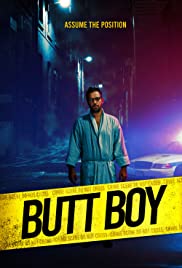
BUTT BOY
US, 2019, 99 minutes, Colour.
Tyler Rice, Tyler Cornack, Shelby Dash, Brad Potts, Austin Lewis.
Directed by Tyler Cornack.
Denis Harvey, from Variety, put his response very succinctly: “A one-joke, bad-taste concept is pulled off with some deadpan panache in this indie comedy "thriller." .
He adds: “Nobody is going to watch a movie called “Butt Boy� in pursuit of sophisticated wit. That said, this feature spinoff from a prior sketch by the collaborative comedy-video team known as Tiny Cinema does manage to be just about the drollest execution possible of the most juvenile concept imaginable.�
This film was written and directed by Tyler Cornack who acts in the central role of a computer office worker,Chip Gutchell, rather catatonic in his lack of involvement in celebrations at work, in his relationship with his wife who is preoccupied with their son. A visit to the doctor and a probe for prostate issues, he has a transformation, comes alive, wants to repeat the experience with his wife and willing, but then various objects around the house, larger and larger, including the pet dog, seem to disappear into his colon area. A child disappears from the park. Chip tries to hang himself.
There is a transition to 9 years later where Chip is still at work, the same staff and spirit, life with his wife and his admiring son, but his going to AA for therapy. He meets an ex-alcoholic detective, Tyler Rice, who is investigating the disappearance of the child. Then, at a bring your child to work day, another disappears. The detective has a theory, not wrong, about Chip who had is his support but who ignores his phone calls. The detective’s boss angrily dismisses his theory about what has happened.
The last part of the film becomes quite surreal, inside Chip’s colon, like a bright red cave, the detective discovering all the missing objects. He lets the dog return home. In the meantime, captured is being honoured by the city for honourable work. Meanwhile, inside the colon, the detective causes it all to literally explode as Chip stands at the lectern, about to make a speech.
The film was part of festivals, Fantastic Festivals, but is not as overtly gory as so many of the entries. Rather, this is make of it what we will.
Published in Movie Reviews
Published in
Movie Reviews
Saturday, 09 October 2021 13:01
Agatha Christie's Poirot Dream
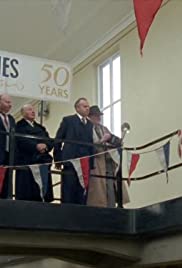
THE DREAM
UK, 1989, 50 minutes, Colour.
David Suchet, Hugh Fraser, Philip Jackson, Pauline Moran, Alan Howard, Joely Richardson, Mary Tamm, Martin Wenner.
Directed by Edward Bennett.
This is an early short story from the television series featuring David Suchet as Poirot. This film as all the central characters, Hastings, Miss Lemon and (and her complaints about her role typewriter and wanting a new one), and Chief Inspector Japp.
The setting is the 50th anniversary of a profitable pie factory, a celebration with the officials and the workers (not enjoying it), and a brass band (with Christopher Gunning, the composer of the series’ theme, as the bandmaster).
The owner is an arrogant man, Benedict Farley (played by Alan Howard). His rebellious daughter is played by Joely Richardson who is in love with a worker who is getting the sack. Is angry with her father.
Poirot receives a letter commanding his presence with Benedict Farley on the condition that he bring the letter – and leave it with Farley. Farley recounts a dream, recurrent, of the time, his getting a revolver, shooting himself. The next day this is what happens. Chief Inspector Japp is called in and the death is ruled a suicide. Poirot is suspicious, gets a clue when Miss Lemon leans out the window to look at the local church clock to tell the time.
There are investigations, interrogations, the group, especially family, being called into the office, everybody looking out the window and Hastings firing a gun to indicate how Farley was shot. Poirot then explains and reveals that the secretary, again played by Alan Howard, had disguised himself as Farley for the interview with Poirot elaborating the dream scenario. The ending is partly happy with Miss Lemon getting an elaborate clock rather than a new typewriter and the two lovers, even though there is now no need, deciding to elope.
1. The popularity of Agatha Christie mysteries? The television series with David Suchet as Poirot?
2. A London story? Poirot in his office, Miss Lemon and the typewriter difficulties, telling the time? Her expecting a typewriter? Poirot buying her a clock! Hastings and his presence?
3. The factory setting, 50 years of making pies, the multimillionaire? The celebration, the factory, exteriors, interiors, offices? The assembled workers? The band? Benedict Farley, his appearance, age, spectacles? Mr Cornworthy in attendance? The arrogance speech, the non-reaction of the workers? Joanna, her leaving to meet Herbert, in love, his being sacked? Her anger towards her father?
4. Poirot receiving the letter, summoned to Farley? The puzzle of bringing the letter? He and Hastings attending, Hastings refused entry, Poirot in the office, the light in his eyes, Farley in the dark? The discussion? The recounting of the nightmare? The time? Dismissing Poirot? Handing back the letter?
5. The workers waiting to see Farley? Cornworthy going into the office? Farley’s death? Suicide? The time, the gun?
6. Chief Inspector Japp being called in, the investigation, the decision of suicide? Poirot re-examining the scene? Miss Lemon and her leaning out the window – and a solution for Poirot?
7. Poirot and the interrogations? Farley’s widow? Her relationship with Joanna? The quarrels? Cornworthy and his duties?
8. The visit to the office, Poirot inviting everyone to look out the window, Hastings firing the gun? The accusation against Cornworthy, against Mrs Farley? Their reactions? Cornworthy shooting, putting the gun in Farley’s hand, the revelation that he had impersonated Farley in the dark? Created the nightmare? The will and Mrs Farley’s inheritance? His running, the pursuit throughout the factory, Hastings chasing, Joanna chasing, Herbert waiting with the bike, his heading off Cornworthy?
9. The arrest, the happy ending, Joanna and Herbert eloping? And Poirot buying the clock instead of the typewriter for Miss Lemon?
Published in Movie Reviews
Published in
Movie Reviews
Saturday, 09 October 2021 13:01
Becoming/ 2020
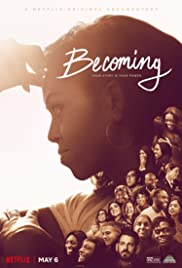
BECOMING
US, 2020, 89 minutes, Colour.
Directed by Nadia Hallgren.
After leaving the Oval Office and her eight years as First Lady of the United States, Michelle Obama wrote a memoir, Becoming, and went on a national tour to promote her book. This is a record of the tour and her many meetings as well as talk shows, filling in a great deal of the background of her growing up, the presence of her mother and brother in her life and during the tour, memories of her dead father and his contribution to her life, a great number of photos.
This is a film which, obviously, will appeal to Michelle Obama fans. And, reading some of the hostile, even hateful, comments on blogs such as the IMDb, she has a number of people who are definitely not fans, of her, of President Obama. For outsiders United States, it may be very surprising to find such venomous comments.
Clearly, this is a film in favour of Michelle Obama. There are many mentions of her husband but he appears in comparatively few sequences, some photos of the past, courtship and marriage, parenthood, campaigning, his installation as president, and his appearing at some of the meetings (noting his courteous and urbane manner).
It appears that the media soon became hostile to Michelle Obama during the campaign, articles and the target of criticisms, especially on television reporting. On the other hand, she was welcomed by many who admired her.
This film is a collage, moving from meeting to meeting (in huge auditoriums with large crowds) to television studios and a range of talk show hosts including Stephen Colbert.
There is comment on her wardrobe, an interview with her stylist with explanations of decisions made, quite a range of dresses and outfits for the meetings and interviews – and her own comment about the campaign when people noted that she had made a speech but gave more attention to what she wore.
She is obviously supportive of her husband, relating well with her daughters, both in sequences from the past As Well Is at the end of the film with the daughters eight years older than they were at the time of the election.
She has little to say about American foreign policy or even economics but concentrates on meeting people, especially African-American? people, and, more especially, the younger generation, engaging with them in conversation, getting them to tell their stories, articulate their hopes, affirming them in their stories. She is full attention to each person she meets, evident in the sequence of her book-signing, explaining that this is how communication should happen.
This is one of the main impacts that this film has, her positive outlook on life, self-confidence, and encouraging this in all her listeners.
For those against the Obamas, there will be little interest in this film. For those who admired the Obamas, especially Michelle Obama, there may not be anything new but there is much that will delight and encourage.
Published in Movie Reviews
Published in
Movie Reviews
Saturday, 09 October 2021 13:01
Natalie Wood: What Remains Behind
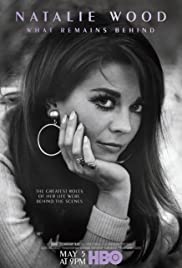
NATALIE WOOD: WHAT REMAINS BEHIND
US, 2020, 100 minutes, Colour.
Directed by Laurent Bouzereau.
This HBO documentary comes almost 4 decades after the death of actress, Natalie Wood, who died in a drowning accident in 1981. The film was produced by her stepdaughter, Natasha Gregson Wagner, a tribute to her mother.
There has always been a prurient curiosity, fostered by the tabloids and American magazines, that there was something suspicious about Natalie Wood’s death, a clash with her husband, Robert Wagner, the presence of her co-star in her last film, Brainstorm, Christopher Walken. This film is at pains to interview those connected. However, Natalie Wood’s younger sister, Lana Wood, maintains an opinion of foul play – and has contributed articles and interviews reaffirming her opinion. Lana Wood is dismissed by the other members of the family.
Natasha Gregson Wagner wants to present a tribute to her mother. She and the producers have been a great pains to find a great deal of footage of Natalie Wood when she was a baby, a small child, her acting roles (including a clip with Orson Welles claiming to be her first co-star, scenes from Miracle on 34th Street), her life as a young starlet, the transition with Rebel without a Cause, her meeting with Robert Wagner and their marriage. (Interestingly, there is no clip from one of her most famous films, The Searchers.)
Natasha Gregson Wagoner appears on screen, warm memories of her mother. Her stepsister, Katie Gregson, also appears and was close to the Wagners. Natalie Wood’s and Robert Wagner’s daughter, Courtney, is also interviewed, speaking warmly also about her mother.
However, the main interview is with Robert Wagner himself, still sprightly in his late 80s, speaking directly about the marriage, the difficulties, the separation, the divorce, his relationship with Mary Marshall (and her two sons by former husband Stanley Donen, the two men remain in close to the Wagoners, Peter Donen and living in their guest house). There is a great deal of footage from all these periods and interviews with Peter Donen and, with close friend Mia Farrow, with Robert Redford, playwright Mart Crowley.
Natalie Wood’s second husband, Richard Gregson, is also interviewed and speaks frankly about the marriage, the birth of Natasha and her growing up, his infidelity, the breakup of their marriage. He is in his late 80s being interviewed and is suffering from Parkinson’s.
So, in one sense, what remains of Natalie Wood are the happy memories and the film footage. But, the film includes extensive clips from many of her films, from those when she was a young child, to her emergence at the beginning of the 1960s as a star, Splendour in the Grass (and her relationship with Warren Beatty), All the Fine Cannibals (and tribute from George Hamilton), scenes from West Side Story and Gypsy, from the mid-60s, Inside Daisy Clover, This Property is Condemned, Love With the Proper Stranger, from later films like Bob and Carol and Ted and Alice (and comment from Elliot Gould). There are clips from her later films, after her being away from the screen for some years and wanting to be with her children, the television From Here to Eternity and The Last Married Couple in America (and tribute from George Segal), and Brainstorm.
The film is really in two parts, early years and films leading up to her death, then going back to her early childhood, comments about her father, her possessive mother prone to tantrums, building up once again to her death.
With this documentary almost 4 decades after her death, Natalie Wood belongs to memories of the older audiences – and to history for younger audiences.
Published in Movie Reviews
Published in
Movie Reviews
Saturday, 09 October 2021 13:01
Catcher was a Spy, The
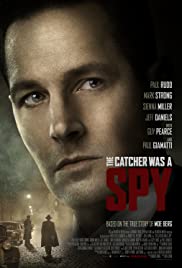
THE CATCHER WAS A SPY
US, 2018, 98 minutes, Colour.
Paul Rudd, Mark Strong, Jeff Daniels, Tom Wilkinson, Sienna Miller, Guy Pearce, Paul Giamatti, Giancarlo Giannini, Hiroyuki Sanada, Connie Neilson, Shea Whigham.
Directed by Ben Lewin.
The screenplay for this film, written by Robert Rodat (The Patriot, Saving Private Ryan, The Command) is based on a 1990s book, Catcher was a Spy: The Mysterious Life of Moe Berg. It has been directed by Australian writer-director, Ben Lewin (born in Poland and a migrant after World War II, directing The Dunera Boys about the Jews put on a ship, finally finding refuge in Australia, film and television in Australia but two decades of working in film and television in the United States).
It can be noted that the year after the release of this film, a feature length documentary, The Spy Behind the Plate, was released, going over the life and mission of Moe Berg, drawing on documents and footage.
This is a story that is more in common with the John Le Carre world rather than an action show. However, there is a section in the middle involving the central characters during the American advance in Italy towards Rome. And, there is also some tension at the end of the film when Moe Berg has to make a decision about his killing of a German scientist or not.
The focus of the film is on Moe Berg himself, something of a loner, an enigmatic figure, a champion baseball player in the 1930s, yet very well educated, encyclopedic knowledge, comfortable in a dozen languages. He was also a patriot, volunteering to work for the American government during World War II, but prepared for war by his participation in a baseball tour of Japan in the late 1930s and his surreptitiously photographing buildings in anticipation of war.
He is taken on by World War I hero, Bill Donovan (The Fighting 69th), finds a desk job too confining, but receives a commission to go to Europe to find the Nobel-prize-winning German scientist, Werner Heisenberg, to find out whether he is building a nuclear bomb for the Germans and, if so, to assassinate him. Jeff Daniels is confidently commanding as Donovan. Berg goes to Italy in company with a scientist played by Paul Giamatti and a military attache a played by Guy Pearce.
The film has a strong supporting cast including Tom Wilkinson as a scientist in Zürich, Mark Strong as the German scientist, Heisenberg, Giancarlo Giannini as an Italian scientist, Sienna Miller as a close friend of Berg, she in love with him, he rather solitary, some with suspicions that he was gay, but his remaining a loner all his life. He was awarded the presidential medal for his work in the war but declined it, never explaining why.
Some of the comments about this film note that it might have been longer, filling in more detail of Berg himself as well is a number of the other characters.
1. World War II? OSS? Espionage? Based on a true story? The opening in Zürich, the glimpses of Scheerer, of Heisenberg, of the Swiss connection and Berg and his decisions? The screenplay then going back to the 1930s and baseball?
2. The baseball is tour of Japan, Berg going, refusing to allow Estella to go, the demonstrations in Japan, the Japanese players, the respect and ritual? His meeting with the Japanese academic, the discussions, the prospect of war? His being dressed in the kimono, photographing the buildings – and later presenting them to Donovan and the OSS as a qualification for his work for them?
3. The US in the 1930s and 1940s? The world of baseball, games, locker rooms, coaches, players? The world of academia, libraries, radio shows? The world of the OSS, work during World War II? Washington DC? The war in Europe, the US troops in Italy, the world of scientists, the transition to Zürich, neutral Switzerland, scientists and universities, lectures? Dark streets? The musical score?
4. The story of Moe Berg? An interesting character? Enigmatic? Motivations? Privacy? The performance by Paul Rudd? His talent as a baseball player? His love of the game? The locker room, criticisms, the player following him, Berg assaulting him? Insinuations about homosexuality? Berg ageing, the discussions about his future with his coach? Seeing him participating in the radio quiz? His knowledge? His vast reading? His knowledge of languages? His relationship with Estela, intimate, yet distant, at home, the going out? Her response to him?
5. Berg’s inquiries about the war, his approaching Bill Donovan, the interview, his being accepted, his desk work, running down the corridor, wanting to be out? The discussions with Donovan, Sam Goldsmouidt, Robert Furman, the concern about nuclear fission, the work of Werner Heisenberg, collaborating with the Nazis to produce a nuclear bomb? The plan, to go with the troops into Italy, connections in Rome, the trip to Zürich, confronting Heisenberg? And, for him to be killed if necessary?
6. The action sequences, the trip to Italy, with the troops, the advance on Rome, the German troops, the snipers? The dangers, Goldsmoudt and his fearfulness, Furman and his leadership? The connection with the Italian professor and the information? Donovan coming to Rome, the plan, Paul Scheerer and his inviting Heisenberg to give a lecture in Zürich? For Berg to meet him, test him?
7. Crossing the border into Switzerland, the partisans and their condemning Berg as a Jew, his speaking Italian, shaming them, threatening them?
8. The contacting Zürich, codes, his being guided into the city? The code name of Mr Aziz? His meeting with Paul Scheerer? The discussions about Heisenberg, the invitation to Zürich?
9. Heisenberg, in the office with Scheerer, the toilet, hearing the gun? Suspicions? His giving the lecture? Noticing Berg? And the Gestapo accompanying him?
10. His agreeing to meet Berg, the restaurant, the chess game, wiping the pieces from the board, the game in their minds, the continual parrying?
11. Berg and his final phone call to Estela? His love for her? His going to the ceremony in the synagogue?
12. Sheerer, the social, the women attacking Heisenberg for being a traitor? His being observed by the Gestapo guards? The discussions with Berg, the chess game? His leaving, Berg following, the Gestapo following? The discussion in the street, the issue of his being a traitor or not, Berg not shooting him? His Swiss contact shooting the Gestapo?
13. The final information, the Germans not producing the bomb, Heisenberg postwar and his moving into the German anti--nuclear movement? A celebrated scientist? Berg, the award of the metal, his refusing but not explaining why? His breaking with Estela and her marrying? His spending his time between baseball games and libraries?
14. An interesting perspective on World War II, American involvement, the OSS leading to the CIA, political assassinations, science and bombs…?
Published in Movie Reviews
Published in
Movie Reviews
Saturday, 09 October 2021 13:01
Informer 3838
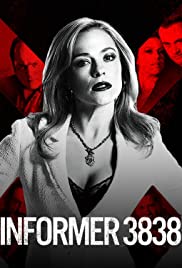
INFORMER 3838
Australia, 2020, 180 minutes, Colour.
Ella Scott Lynch, Stephen Peacocke, Jane Haber, Rhys Muldoon, Gyton Grantley, Robert Mammone, Richard Davies, Tim Ross, Ian Bliss, Olympia Valance, Jacqueline Brennan.
Directed by Geoff Bennett, Ben Lucas.
The series was made for free to air television, the Nine Network, parallel with series made about crime in New South Wales, Underbelly.
The series was aired soon after the Royal Commission investigating Informer 3838, lawyer Nicola Gobbo.
The film takes audiences back to the 1990s, crime, drug dealing, murders and executions in Melbourne and in the state of Victoria. Notable figures, Tony Mokbel and Carl Williams (who was murdered in prison) feature in this story. Their activity continues into the first decade of the 21st-century with Mokbel fleeing to Greece, then in prison, and Carl Williams in prison and then murdered there.
Nicola Gobbo is presented as ambitious, centre of attention, risk-taking, rather wild in her behaviour, moving into the criminal world, acting as defence lawyer, skilful in getting bail for various criminals. She is comfortable in this world, socialising, drink, cocaine, but eventually leading to a stroke.
She is approached by police officers to give information, eventually is repelled by some of the activities, especially of Carl Williams, and decides to give information to the police about her clients, the police taking responsibility for a lawyer giving information about her clients.
The film brings the situation and characters to life – and raises issues of legal ethics.
1. Based on actual characters and events? The state of Victoria? Crime? Drugs? Policing? The law?
2. This production so soon after the Royal commission concerning informer 3838, Nicola Gobbo? The series perception of crime in the 1990s? Into the 21st century?
3. The Melbourne settings, the University in the 90s, the crime world, affluent criminals, drug dealing, murders? Contact with the police? Deals, homes in the suburbs, prison sequences, Bali? The musical score?
4. The series designed for free to air television audiences? The wide audience? The audience familiar with the characters and situations? Or not?
5. The portrait of Nicola Gobbo? Over 25 years? The background and connections, education, University, wild behaviour, her ambitions, the centre of attention and attraction, prepared to take risks, Emma and her confiding, her advice, Nicola Gobbo ignoring it? The warnings? The introduction to the criminal world, to Tony Mokbel, Carl Williams? Nicola Gobbo, her capacity as a defence lawyer, getting criminals bail? Against the odds? Juicy and her relationship with him (even betraying him and rationalising this)? The association with Paul Dale? His police situation, accusations? Her friendship with the Hodsons, defending them? Socials, drinking, cocaine? The effect over the years? Its toll, her stroke? Dislike of Carl Williams? His life in prison, her informing? Mokbel and his taking refuge in Greece? The police links, the meetings, the secrecy? Simon Overland in charge? His taking responsibility? The information, the code number, dangers and her being followed, her going to Bali? The Royal Commission?
6. The criminals, Tony Mokbel and his reputation, drug Lord, bail, information about him, going to Greece?
7. Carl Williams, his wife, crime, control, deaths, informing on him, prisons, his friends in prison, their killing him? The loudness and aggression of his wife?
8. Paul Dale, the police, his connections and partners, the accusations, his being dismissed, his appeal, upheld, in prison, his defence?
9. The Hodsons, living in Kew, suburbia, their children, involved in the drug dealing, old-style criminal, the house in Oakleigh, the police, the plans, the connection with corrupt police, their being caught, the defence? The visualising of the killer of the Hodsons going to the house? Accusations against Paul Dale? The case not solved?
10. A portrait of crime, police corruption, police investigation, the ethics of informing on clients?
Published in Movie Reviews
Published in
Movie Reviews
Saturday, 09 October 2021 13:01
Patrick Melrose
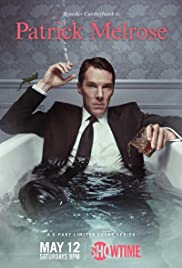
PATRICK MELROSE
UK, 2018, 5X50 minutes, Colour.
Benedict Cumberbatch, Jennifer Jason Leigh, Hugo Weaving, Jessica Raine, Sébastian Maltz, Prasanna Puwanarajah, Pip Torrens, Indira Varma, Gary Beadle, Blythe Danner, Morfydd Clark, Celia Imrie, Holliday Grainger, James Fleet, Harriet Walter, Marcus Smith, Dainton Anderson, Elisabeth Berrington, Hippolyte Girardot, Irene Jacob.
Directed by Edward Berger.
Patrick Melrose is a five-part television series based on novellas by Edward St Aubyn, adapted for the screen by David Nichols, directed by the German Edward Berger. The novellas are based on the personal life of the novelist.
There are five episodes but not in chronological order. The first is set in 1983, then moving back to 1967, onto 1990, 2003, 2005. The title role is played by Benedict Cumberbatch, once again showing his range and versatility, having to age 23 to 46. Sébastian Maltz is very impressive as Patrick Is a Little boy. Hugo Weaving is the father, David Melrose, ultimately an embodiment of evil. Patrick spends his life trying to extricate himself from the malevolent influence of his father’s attitudes. Jennifer Jason Leigh plays his American mother, herself unable to move from the dominating power of the husband except to escape into charitable work and absence from home, professing to love her son, but actually abandoning him, something he long presents as well.
In the first episode, there is an introduction to Patrick, finding him a drug-addled young man, out of control, supported in friendship by his fellow-addict, Johnny (Prasana Puwanarajar). Patrick receives the news of the death of his father, instigating a number of flashbacks to his life as a boy, especially at their holiday mansion (owned by his mother’s family) in southern France. He travels to New York by plane, something of a nightmare flight, settling into a hotel with some arrogance, going to the morgue and being directed to the wrong room, a party celebration. He is in a relationship with Debbie at home and talks about reform. However, he lacks control, collapses, goes on the prowl to underpasses in New York City to get drugs, collapses and finally gets back to England and John and his care.
The flashbacks are powerful, the bad impression of David Melrose, the background of his music, his father’s dominance and wanting him to be a doctor, his studies for medicine, but not having to practice because of his marrying a wealthy wife. He is harsh, cynical, rude to people. Patrick is in fear of him – and later episodes revealed why.
In the 1960s, the family is on holiday again, Eleanor Melrose goes to the airport with a friend from America who is visiting with her scholarly husband, taking a detour to a theme park, the OK Corral, momentarily stranded on a Ferris wheel, hurrying to the airport to meet Nicholas, a close friend of David, Patrick’s godfather (Pip Torrens), also cynical, sardonic and superior. He has brought along a young woman, Bridgid (Holliday Grainger) who is more interested in a friend who is a member of a band. The dinner is very tense, Eleanor’s friend being very straightforward in her comments to David, leaving the table, encountering Patrick, talking with him, promising to bring his mother. However, David controls the table, controls Eleanor and she does not go. Which means that Patrick spends a long time alone, wandering the grounds, looking down a deep well.
There is a significant day for Patrick, his mother promising to come back and urging him to stay with his father. David is extremely stern towards his son, making demands, telling him about his theory of bringing up children, that if they can survive their childhood and its difficulties, they can survive anything. There are intimations of sexual abuse.
However, by the 1990s, Patrick has survived, studying law, going to groups, not wanting to attend a lavish party hosted by Brigid from the past, but urged by Johnny who is participating in groups of therapy. The guest of honour for the party is Princess Margaret, Harriet Walter doing quite a caustic impersonation, the princess becoming very dominating, intolerant of people, and rude to Bridget’s daughter. Bridget also becomes aware that her husband is unfaithful to her and, towards the end of the party, leaves with her daughter. Her mother had also come, but Bridget, desperately wanting to be upwardly mobile, urges her mother to go out for the meal and return afterwards. Patrick sits through the meal, observing? There is a scene where the French ambassador spills some sauce on Princess Margaret, her demanding that he clean it, the ambassador’s wife leaving angrily – and Hippolyte Girardot and Irene Jacob playing the French couple.
Patrick is partially recovered, friendly with John was in a relationship with Debbie? Patrick is very awkward in manner of the party, observing, encountering a friend, Julia, and having sexual experience with her and then breaking it off? Patrick also takes the opportunity, courageously and fearfully, to explain to Johnny the nature of the sexual abuse – which is dramatised powerfully in flashbacks. However, at the end, he encounters a young woman, genial, Mary.
In 2003, he is married to Mary, has two sons, they were on holidays in the south of France at the mansion. There are also many memories in flashbacks during this episode. However, his mother has returned, she is old and feeble, has invited enthusiasts for her courses to stay in the house and prepares a will leaving everything to them. Patrick does his best, angrily, to find ways of annulling the will. However, she ultimately signs it. Seamus, an Irishman is the main character bonded to Eleanor but too busy writing his book to visit her when she is sick. Mary’s mother, played by Celia Imrie, also visits and becomes involved with the group. Julia also arrives, working on a divorce, bringing her daughter Lucy who is meant to play with the boys. Patrick waits outside her room at night but is caught by one of his sons, yet continues the affair.
Patrick is smouldering, drinking again, on some drugs medication but wanting more, breaking with Julia, Mary knowing what has happened, deciding to break with Patrick and taking the boys away.
Eleanor dies in 2005. This is the final episode, Patrick’s attempts to free himself from the influence of his father, to free himself from his mother. One of the factors in this episode is that Eleanor wants to die, is incapacitated, in an institution, asks for Patrick to help her with her suicide, his making inquiries of organisations, his arranging for her to go to Switzerland – but she reneges.
Patrick has to organise the funeral and relies on Mary, a strange protest of loving him. He also has the support of Johnny and members of the groups. Julia comes to the funeral and they reminisce about their affair. At the funeral, the members of the community to whom Eleanor left her house and wealth, to take over giving eulogistic and romantic speeches. Mary does the reading from I Corinthians and Nicholas, who was present, is cynical, trotting out the same texts. Patrick attempts to speak but has an outburst about his mother, leaves the church and goes for a walk.
There is a lavish reception, Patrick feeling quite uncomfortable, Mary being the first. Again, members of the community present with some abrasive manners, a woman interrogating people about their mental illness, especially pressing with Nicholas who denounces her but collapses and is taken away by ambulance, later dying.
Patrick goes back to his apartment to be by himself and to try to cope with his loss. Most significant, he has a flashback to his father, imagining a different scenario, that he had stood up to his father, defying him in the face of the abuse. This might have made such a difference to his life. His mother dead, his coping with his father, coming to terms with his life and career as well as his family, the audience is left to speculate about Patrick Melrose’s future.
Published in Movie Reviews
Published in
Movie Reviews